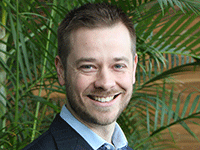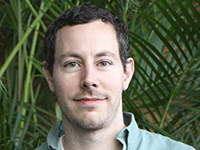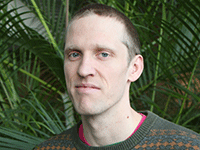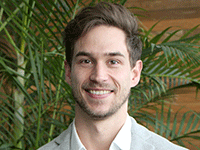Seven MCB postdocs have recently garnered fellowships that will enable research into the brain, behavior, and genetics.
Two of the postdocs obtained fellowships from the NIH. Bushra Raj of the Schier Lab received a NIH Pathway to Independence Award (K99/R00). Meanwhile, Nuné Martiros of the Murthy Lab was given a National Research Service Award (NRSA) fellowship.
Christophe Dupre and Gregor Schuhknecht, both of the Engert Lab, received Early Postdoc Mobility Fellowships from the Swiss National Science Foundation, and Andreas Kautt of the Hoekstra Lab was awarded a fellowship from the German Science Foundation.
Nicholas Jourjine of the Hoekstra Lab accepted a fellowship from the Jane Coffin Childs Memorial Fund, and Daniel Friedrich of the D’Souza Lab received an award from the Human Frontiers in Science Program.

Christophe Dupre
Christophe Dupre has joined the Engert Lab under the auspices of an Early Postdoc Mobility Fellowship from the Swiss National Science Foundation (SNSF). The fellowship provides 18 months of funding to newly minted Ph.D.s who have Swiss citizenship or completed their degrees in Switzerland.
At Harvard, Dupre will use an electron microscope to probe the nervous systems of a small aquatic invertebrate called Hydra. He has been working with these tiny, tentacled creatures since high school, when he did a research project on photosynthetic algae that live within Hydra cells. But his current research question was inspired by a series of calcium imaging studies that he conducted in Hydra during graduate school.
“As I explored neurons firing in Hydra over multiple weeks, I was surprised to observe that an individual Hydra can become up to 10 times bigger or smaller during its lifetime,” he recalls. “This will happen naturally as the amount of food that is available changes…Moreover, this [growing and shrinking] doesn’t seem to affect the behavior of the animal—as it will move around, catch the same type of prey, and execute the same tasks no matter what its size is.”
Dupre will investigate Hydra nervous system functions by slicing them into ultra-thin layers and scanning them with an electron microscope in a technique called serial-section electron microscopy. By doing so, he hopes to find out how nervous systems perform the same functions in animals of vastly different sizes.
“I feel deeply honored to have received this fellowship,” Dupre says. “It will guarantee funding for my research in the year to come without constraint on how this funding should be spent.”
“Receiving this fellowship would not have been possible without the support of my current advisors Florian Engert and Jeff Lichtman, who helped me initiate this project and collect preliminary data in order to prove its feasibility,” Dupre adds. “I am very grateful for their continuous, enthusiastic and generous support.”

Daniel Friedrich (D’Souza Lab)
Daniel Friedrich of the D’Souza Lab has been chosen as a recipient of the Human Frontiers in Science Program (HFSP) Long-Term Fellowship, which is administered by an international organization that promotes excellence in life sciences. HFSP Long-Term Fellowships provide three years of support and allow recipients to conduct research through multiple labs.
“’I feel very honored about receiving the HFSP Long-Term Fellowship, and I didn’t expect at all to get it, as it is very competitive,” Friedrich says. “To be eligible, you have to move to a new country, and projects significantly departing from the Ph.D. research are particularly encouraged.”
Friedrich researches—in collaboration with the Arthanari Lab at Dana-Farber Cancer Institute—the process of non-canonical translation. Translation, the production of proteins from RNA, typically starts with recognition of a specific RNA modification called the 5’ cap. But in some cases, translation occurs without a 5’ cap. Scientists know little about non-canonical translation, but it can contribute to cancers and other diseases. Friedrich is especially interested in the initiation of non-canonical translation and uses structural biology techniques to study the intrinsically disordered proteins that help start non-canonical translation.
Friedrich’s interest in translation traces back to his time as a biochemistry Ph.D. student in Germany. “I was blown away by the many open questions that exist in biology!” he says. “I attended many talks, and in particular one of them left me totally puzzled how little is known about RNA structures and their interactions with proteins – which really attracted me.”
He says that applying for fellowships can be a productive way to hone in on research questions. “For me, it was a great way to find out what I’m really interested in, and it gives me a lot of freedom and a feeling of independence,” he says.

Andi Kautt (Hoekstra Lab)
Andreas Kautt will spend two years working on behavioral genetics as a German Science Foundation (DFG) Postdoctoral Fellow. The DFG fellowship program enables German scientists and researchers who trained in Germany to gain experience abroad.
“I am very grateful for the support this fellowship will provide me,” Kautt says. “It is a real privilege and very comforting to know that, beyond my current fellowship from the European Molecular Biology Organization (EMBO), I will have the financial support to stay here for another two years to focus on my research.”
Prior to joining the Hoekstra Lab, most of Kautt’s research explored genetic variation behind physical traits, but today he investigates the genes that underpin predator avoidance behavior. “Recognizing and avoiding predators is arguably a very important behavior for many organisms in the wild,” he explains. “The failure to detect and avoid a predator can be fatal; being overly cautious can reduce the time spent foraging and searching for mates.”
Kautt uses deer mice that live on a chain of islands in California as a case study. On some of the islands, the mice live alongside a mammalian predator; on other islands, they don’t. Mice from different islands do not respond the same way to the predator’s odor, so comparing the mice’s behavior and genomes allows Kautt to study how genetics and evolution shape behavior.

Nick Jourjine (Hoekstra Lab)
Nicholas Jourjine of the Hoekstra Lab has been selected as a Jane Coffin Childs Postdoctoral Fellow. The fellowship is run by the Jane Coffin Childs Memorial Fund for Medical Research (JCC Fund), an organization that has been supporting basic research since 1937. Their fellowship provides three years of financial support to recipients who have recently completed their Ph.D.s.
Jourjine says he feels “very honored and surprised” to receive the JCC Fund Fellowship.
As part of the Hoekstra Lab, Jourjine is studying the cries of infant deer mice, in particular why infants from some deer mouse species seem to cry much more often than others. “My ultimate goal is to understand the heritable causes of behavioral variation in nature,” he says. “Infant vocalizations, particularly those made by deer mice, have a lot of features that make them a good ‘case study’ in which to make progress towards this understanding.”
“Infant deer mouse cries are also very similar to the cries of human infants, so studying them might be able to tell us something about how human infants vocalize and why some vocalize more than others,” he adds.
Jourjine says that the three years of funding will make it possible to attempt more “high risk, high reward” experiments that he otherwise might not have tried. “I want to thank my adviser Hopi Hoekstra for her support, and the rest of the Hoekstra Lab for making it such a great place to do science!” he says.

Nuné Martiros (Murthy Lab)
Nuné Martiros has been named as a recipient of the NIH’s F32 Ruth L. Kirchstein Postdoctoral Individual National Research Service Award (NRSA), which enables promising postdoctoral candidates in the U.S. to pursue research on health-related topics.
“I’m thankful that the NIH and reviewers saw value in my proposed work and that I am able to develop as a scientist by learning new techniques while having freedom to pursue the questions that I find interesting,” Martiros says.
As a member of the Murthy Lab, Martiros will look into why smells have such profound effects on emotions and memory. “This idea is particularly compelling because there are evolutionarily conserved brain pathways by which odor information flows directly to regions of the brain involved in reward, motivation, and emotion,” she says. “No other sensory modality connects as directly to these areas of the brain.”
One brain region that likely plays a key role in this process is the olfactory tubercle. Martiros will set up behavioral experiments where she images the activity of specific neuronal types in the olfactory tubercle and manipulates these neuronal pathways to see how this neurons in this brain region contribute to odor responses.
“I’ve always been interested in the parts of the brain that are involved in reward and motivation, particularly those brain circuits that are evolutionarily old – including the subcortical regions called the basal ganglia,” Martiros says. “In my previous work, I studied how the basal ganglia facilitate habit learning. Now, I am studying a different region of the same brain structure with regards to odor processing.”
She adds that she is grateful to MCB faculty and chair Venkatesh Murthy for supporting her in bringing her research ideas into reality.

Bushra Raj (Schier Lab)
Bushra Raj of the Schier Lab has been chosen for the NIH Pathway to Independence Award (K99/R00), which provides up to five years of funding to researchers as they complete their postdoctoral projects and become primary investigators.
“I feel honored to have received this award and am thankful that the NIH recognizes the need to support young scientists during a critical junction in their careers,” Raj says. “This award has already taught me a tremendous amount on how to write an effective grant, and will help me establish my future lab.”
Her research focuses on brain development and the molecular processes that underpin it. She is particularly fascinated by the brain’s ability to grow many different types of cells. “I have always been intrigued by the concept of molecular complexity—that is, the various molecular properties that make cells in our body different from each other,” she says. “The brain is a fantastic model to ask these types of questions, since it is bursting with many differences.”
Raj’s goal is to learn how a small pool of cells in the early embryo gives rise to dozens of different cell types, which organize themselves into a structurally complex organ. “By understanding the molecular logic underlying this process, we can obtain a blueprint of how gene expression changes during development shape the brain and how this process is perturbed in disease,” she says.
Her next steps will be to perform transcriptomic and genomic global analysis of cell diversity in the zebrafish brain. In so doing, she will identify some of the key drivers of cell fate.
She adds, “I would like to thank my mentors, lab mates, and collaborators who have helped shape this project and made the scientific experience fun and exciting.”

Gregor Schuhknecht (Engert Lab)
Gregor Schuhknecht is originally from Germany, but the fact that he completed his Ph.D. at the Institute of Neuroinformatics (ETH Zurich and University of Zurich) in Switzerland allowed him to receive an Early Postdoc Mobility Fellowship from the Swiss National Science Foundation. The award, which typically funds 18 months of research, allows Swiss and Swiss-trained scientists to do postdocs abroad.
“It makes me deeply grateful to Switzerland and the SNSF that in addition to training me as a neuroscientist, they continue to invest in me and my academic career after my training there is completed,” Schuhknecht says.
Like fellow SNSF fellowship recipient Christophe Dupre, Schuhknecht is working in the Engert Lab. During his postdoc at Harvard, Schuhknecht is studying how the brains of zebrafish decide whether the fish should swim to the left or right on the basis of what the animal sees. His experiments build on past Engert Lab research on the neural algorithms (or “strategies”) that the fish brain uses to make such decisions. Now, Schuhknecht is trying to understand how the complex networks of connected nerve cells in the fish brain implement these computational strategies.
“Perceptual-decision making is traditionally considered to be a higher brain function,” he says. To me, it is striking that zebrafish seem to use similar computational strategies as monkeys and even humans…This makes it so fascinating to study this behavior in the zebrafish, where we have a lot of experimental tools that allow us to investigate in much more detail how networks of connected nerve cells perform these computations.”
Schuhknecht’s work relies on expertise he developed during his PhD research, when he combined anatomical and functional analyses of synapses to understand more about the communication between neurons at these tiny contact points.
Congratulations to these seven outstanding postdocs and happy holidays to all!


